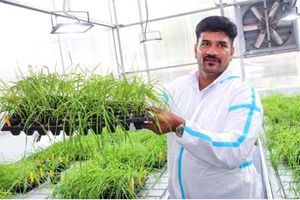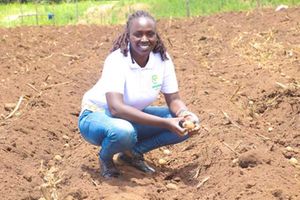
AGRA Director for Policy and State Capability Boaz Blackie Keizire.
To finance agri-food systems sustainably, innovation is necessary. The African Union (AU) Heads of State and Government adopted a 10-year Agri-food Systems Development Policy and Strategy, dubbed the Kampala Declaration, recently. The aim is to make the continent food secure and transform businesses, lives and people working in agriculture by 2035. Indiazi Agade spoke to Boaz Blackie Keizire, AGRA’s Director for Policy and State Capability, on the continental bloc’s commitments.
What is your assessment of the Malabo Declaration, which preceded this new strategy?
The Malabo Declaration was an important step, building on lessons from the 2003 Maputo Commitments, which focused on mobilising state resources, particularly the 10 percent public expenditure on agriculture.
Malabo’s game-changer was the introduction of mutual accountability and a peer review mechanism, driving countries to track progress, learn from one another and strengthen farming investment programmes.
While it spurred competition and commitment, challenges beyond national control – such as climate shocks (El Niño in Southern Africa, drought in the Horn of Africa) and Covid-19 disruptions to input supply chains – hindered full achievement of its objectives.
Nonetheless there was great progress.
What was AGRA’s role in the Malabo Declaration?
AGRA was instrumental in advancing the declaration by supporting the African Union in shaping the biennial review mechanisms.
We strengthened national seed systems, championed policy reforms to liberalise seed and fertiliser industries and enhanced cross-border markets by addressing non-tariff barriers, roadblocks and export bans.
Additionally, AGRA worked with governments to reduce policy unpredictability, gave incentives to farmers and streamlined farmer registration to improve efficiency in the distribution of fertiliser and other inputs.
Women and young people still face an uphill task accessing finance and markets. Why is that the case?
Cultural and historical barriers often limit women and young people from accessing finance, land and other critical resources, thus restricting their engagement in agriculture.
To address this, AGRA developed the Youth Agribusiness Strategy – a continental policy framework – and has been supporting AU member states mobilise resources.
We also help design policies and strategies, facilitate access to land and finance and intentionally create incentives to attract young people into agriculture – especially by leveraging digital tools to integrate them into the value chains.
How different is the Kampala Declaration from Malabo and Maputo?
The Kampala Declaration upholds the 10 per cent public expenditure commitment from Maputo and.
However, it goes further by exploring new funding models such as blended finance and pension funds to drive agri-food systems.
An important innovation is the Financing Flows to Food Systems (3FS) tool, which tracks resource allocation across food system elements.
This data-driven approach helps governments make informed decisions on funding priorities and optimising investments.
How do you see AGRA’s role in the implementation of the Kampala Declaration?
AGRA is committed to supporting the Kampala Declaration by leveraging our expertise in seed systems, sustainable farming, regenerative agriculture, last-mile delivery, extension services and fertiliser application.
We will help countries design flagship programmes and bankable investment strategies to attract public and private sector funding.
Additionally, we have strengthened our youth and gender programmes to ensure inclusivity, creating targeted initiatives that integrate young people and women into agricultural value chains.
Beyond policy design, AGRA is investing in domesticating these policies to drive real change at farm level – boosting farmer incomes, creating jobs for young people and ensuring women’s participation in farming and agribusiness.
Do you see the Kampala Declaration doing better than Malabo and Maputo?
I’m optimistic the Kampala Declaration will build on Malabo’s lessons to drive greater impact. We are in the digital era, with young people being the largest demographic. Technology offers new opportunities for transformation.
Digital solutions can improve farmers’ access to inputs, market intelligence and precision through satellite imaging and data-driven insights.
On resource mobilisation includes growing commitment to innovative financing – leveraging pension funds, commercial bank investments and blended finance models.
To unlock these opportunities, strong policy incentives and thought leadership will be essential in ensuring sustained investment and impact.
How important is the upcoming Financing Agri-food Systems (FINAS) 2025 Dialogue?
The FINAS 2025 Dialogue is a crucial platform for advancing sustainable financing of Africa’s agri-food systems. It will provide data-driven and evidence-based solutions to key questions. How do we attract investments? How can we leverage emerging innovations, including green and climate-related financing? What lessons can we learn from existing financial instruments? What new models should be explored?
FINAS presents a major opportunity for countries and stakeholders to learn about investing and financing agri-food systems sustainably.
Do you see African governments meeting their 10 percent commitment this time?
I hope so. The challenge has not been refusal but competing priorities. If we can clearly demonstrate to the ministries of finance that investing in agri-food systems drives economic growth, job creation and digital transformation, they are more likely to allocate more resources.
Beyond meeting the 10 percent commitment, governments may also adopt innovative financing tools to reduce reliance on borrowing and ensure sustainable investment in the sector.










